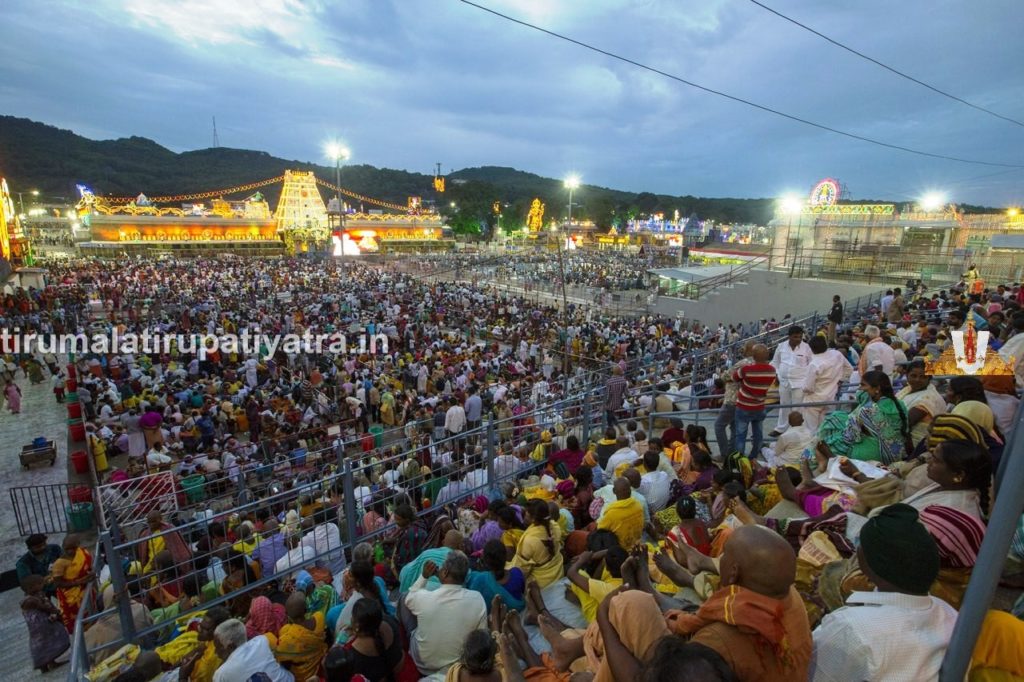NITYOTSAVAS
The utsavas of the Lord held throughout the year can be divided into
- Nityotsavas (daily ceremonies),
- Varotsavas (weekly ceremonies),
- Masotsavas (monthly ceremonies) and
- Varshikotsavas (annual ceremonies).
Let us try to know about them briefly.
Every day several sevas and utsavas are held for the Lord in Tirumala right from early morning till night. Let us discuss them in brief.
SUPRABHATHAM
(WAKING UP THE LORD)
The first service offered to the Lord in Tirumala is Suprabhatam (Waking up the Lord). Waking up Srinivasa Prabhu lying down in the silken bed in Shayana Mantapa (Bed Room) is called Suprabhatam.
Every day early in the morning the Acharyas sing at the Golden Entrance the verses from the Suprabhatam such as “Kousalya Supraja Rama…” just as one of descendants of the Annamacharya family sings “Meluko Shringara raya” to wake up the Lord. At that time, the priests, jiyyangars, officers of the temple, and those devotees who paid for the Suprabhata Seva will be waiting eagerly at the Golden Entrance for the doors of the temple to be opened.
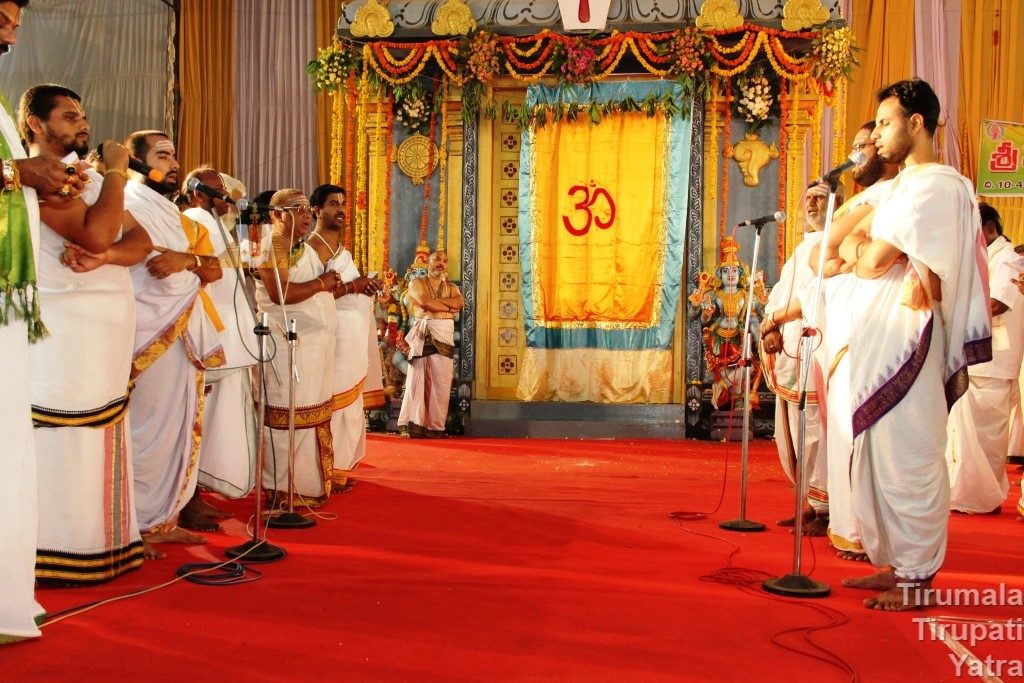
The doors of the Golden Entrance are opened after the completion of the Suprabhatam recital by the Acharyas. All the people go there one by one to have a glimpse of the Lord and to receive haarathi (camphor lit), teertham (holy water) and shathari (the symbolic feet of the Lord). The devotees of the Aarjitha Seva also go to see the Lord. The vision of the Lord from head to feet in this seva is called “Visvarupa Sandarshanam”. It cleanses you of all your sins.
Hence, it is said, “Padadarshanam papa vimochanam,” that is, the sight of the Lord’s feet redeems you of all your sins.
TOMALA SEVA
(GARLANDING SERVICE)
Garlanding the main deity and utsava deitites of Lord Sri Venkateshwara along with other idols with flowers and sacred basil is called Tomala Seva. The way the garlands are hung down from the shoulders of the Lord is called Tolmalai. This, in turn, changed to Tomala. Tol means shoulder. While those who paid for the seva can participate in this, there is no entry for anyone in the evening Tomala Seva.
The priests decorate the main deity with the garlands brought by the Ekangi (a recluse) or Jiyyangars from the flower room. The seva takes place for about half an hour.
KOLUVU
(COURT)
After the Tomala Seva, there will be Koluvu (Court) for Koluvu Srinivasa Murthy who is placed on the throne in the Snapana Mandapa of the Golden Entrance. The particulars of tithi (the number of the day in a month), vaara (weekday) and nakshatra (the presiding star) of the day are read from the Hindu Calendar (Panchanga Shravanam) along with the income and expenditure statement of the earlier day to this deity.
Later the Lord is offered the mixture of jaggery and sesamum flour as naivedyam.
On the Dhvajaarohan day (Flag Hoisting of Garuda), the first day, however, the Koluvu takes place before the Golden Entrance. Every day in the Koluvu, Srinivasa gives rice along with betel leaves and honorarium (dakshina) in charity (Tandula Daanam) to the priests. The priests bless Lord Srinivasa to be wealthy every day (Nityaishvaryo bhava). This takes place in complete solitude.
SAHASRA NAMAARCHANA
(WORSHIP WITH THOUSAND DIVINE NAMES OF THE LORD)
After Tomala Seva, Sahasra Namaarchana is done to the main deity every morning. Reciting the thousand divine names of the Lord, the holy feet of the Lord are worshipped with the basil leaves offered by the Jiyyangars. Later the basil at the feet is taken out to worship Sri Maha Lakshmi reciting her 24 divine names. It takes place for about half an hour. The devotees can participate in this on payment of required fees.
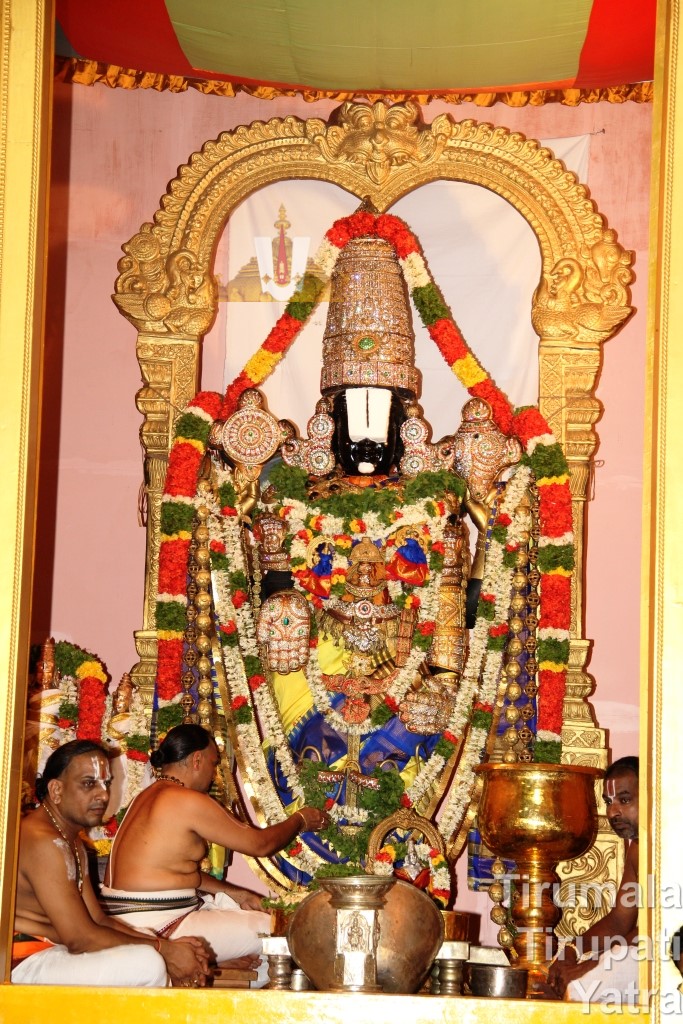
In addition to the above, the Lord is worshipped twice reciting his 108 divine names (Ashtottara Shata Namaarchana) after the second and third bells. They are done in solitude. The paid devotees, however, can participate in the Ashta Dala Pada Padmaraadhana as part of the second archana on Tuesdays on payment of required fees.
NIVEDANA
OFFERING OF FOOD
Immediately after the Sahasra Namaarchana, Laddus, Vadas, Tamarind Rice, Pongal, Curd Rice, etc are offered to the main deity and other images of the Lord in the sanctum sanctorum every morning.
- The first food offering is called the first bell.
- The second one in the afternoon is called the second bell.
- The third one at night is called the third bell.
Sweet Pongal called the “Tiru Veesam” bell is offered to the Lord just before Ekantha Seva (Laying the Deity to Sleep). Later, it is offered to Sannidhi Bhashyakara. All these foods are offered by the priests alone.
SHATTUMORA
Prasadams like Curd Rice and sweet Pongal already offered to the main deity are again offered to Ramanuja. Later, Sri Vaishnava Acharyas recite Divya Prabandhas. It is called Shattumora. The Achryas receive the prasadams after the nivedana.
KALYANOTSAVAM
(MARRIAGE CEREMONY)
In the Sri Venkata Ramana Swamy Marriage Pandal of the Sampangi circumambulation, the marriage ceremony (Kalyanotsavam) takes place for Sri Malayappa Swami with Sri Devi and Bhu Devi every noon at 12 O’ clock.
Devotees can participate in this utsava on payment of prescribed fees.
Kalyanotsava is generally conducted as part of special utsavas or on significant occasions.
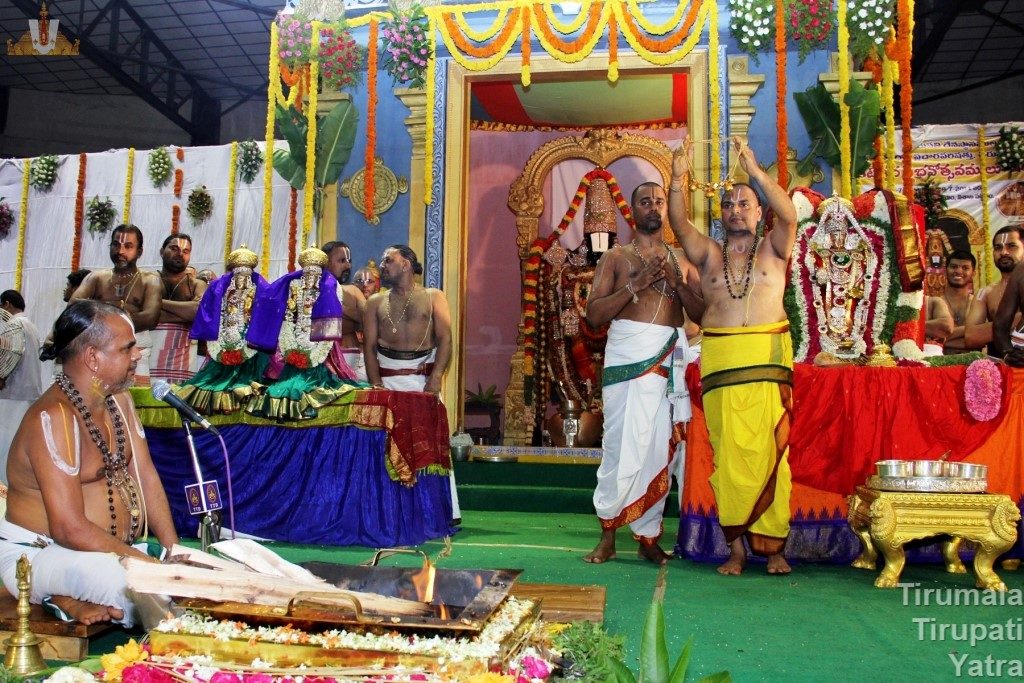
It was Tallapaka Annamacharya who conducted it as Nitya Kalyanotsava (Daily Marriage Ceremony). That is the reason why the descendents of Tallapaka Annamacharya have the privilege of being kanyaadaatas (those who offer daughters in marriage) in these ceremonies even today.
This Nitya Kalyanotsavam is performed every day without fail except during special Utsavas like Brahmotsava, Pushpa Yaga, and Pavitrotsava. The devotees who participate in this ceremony get prasadams of the Lord.
DOLOTSAVA
(SWING CEREMONY)
There will be a Dolotsavam or swing ceremony for the Malayappa Swami along with his consorts at 2 p.m. every day in the Mirror House (Addala Mantapam) at the instance of the devotees who pay for it only.
This service will not be available if there are no paid takers.
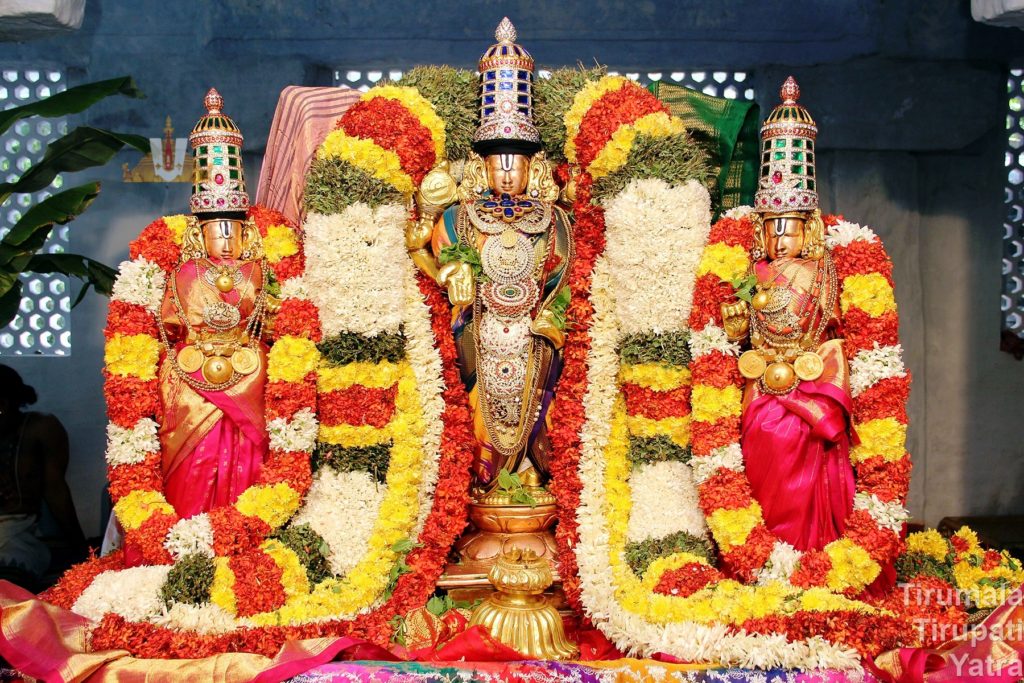
ARJITHA BRAHMOTSAVA
There will be paid Brahmotsavam for Sri Malayappa Swami along with Sri Devi and Bhu Devi in the Vaibhava Mantapa situated in front of the temple at the instance of the devotees who pay for it. It will be conducted after the Kalyanotsava.
VAAHANA SEVALU
(CARRIAGE SEVICE)
Devotees can offer carriage service for Lord Sri Venkateshwara if they so desire on payment of prescribed fees. It will not be held in the absence of paid requisitions. There will be mainly Garuda Vahana, Hanumantha Vahana, Pedda Shesha Vahana, etc. every day at 2 pm in the Vaibhava Mantapa situated in front of the temple at the instance of the devotees only who pay for it.
ARJITHA VASANTOTSAVA
Arjitha Vasantotsava will be held again at 3 pm everyday for the paid devotees only in the Vaibhava Mantapa situated in front of the temple for Sri Malayappa Swami alongwith Sri Devi and Bhu Devi.
SAHASRA DEEPALANKARANA SEVA
(SERVICE WITH THOUSAND LAMPS)
Every evening at 6 O’Clock there will be Unjal Seva (Swing ceremony) known as Sahasra Deepalankarana Seva in the Koluvu Mantapa (Court) situated on the southeast side of the temple outside. Malayappa Swami along with Sri Devi and Bhu Devi is taken in procession to the Pandal where a thousand lamps are lit for the Unjal Seva. Those who paid for the Seva can also participate in this.
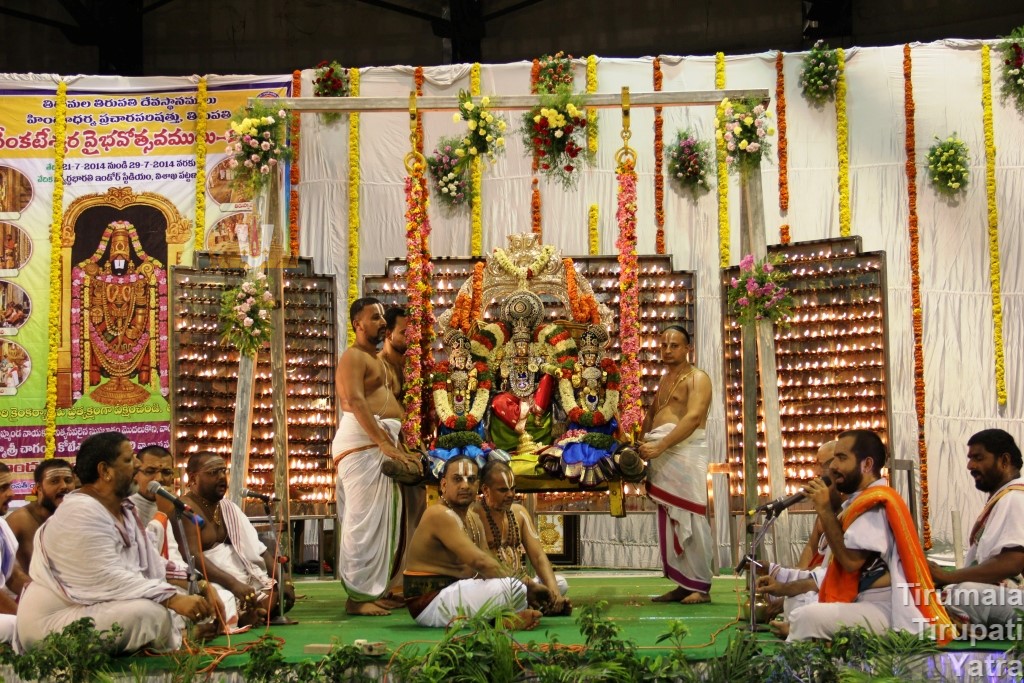
It is conducted every evening without fail. After the Sahasra Deepalankarana Seva, the Lord is taken in procession in the wider circumambulation path. Sahasra Deepalankarana Seva, however, is offered to Rukmini and Sri Krishna on the day of Rohini star and to Sita, Rama and Lakshmana on the day of Punarvasu star every month.
On the day of Arudra star, there will be a procession of Sri Ramanuja idol in a palanquin opposite to that of Sri Malayappa Swamy.
EKANTHA SEVA
Ekantha Seva (Leaving in Solitude) is also called Panpu Seva (Going to Bed) or Pavvalimpu Seva (Putting to Sleep). This last seva is quite important in the daily programmes of Tirumala Lord’s temple. Sarva Darshanam (free entrance for all) is stopped at the time of Ekantha Seva.
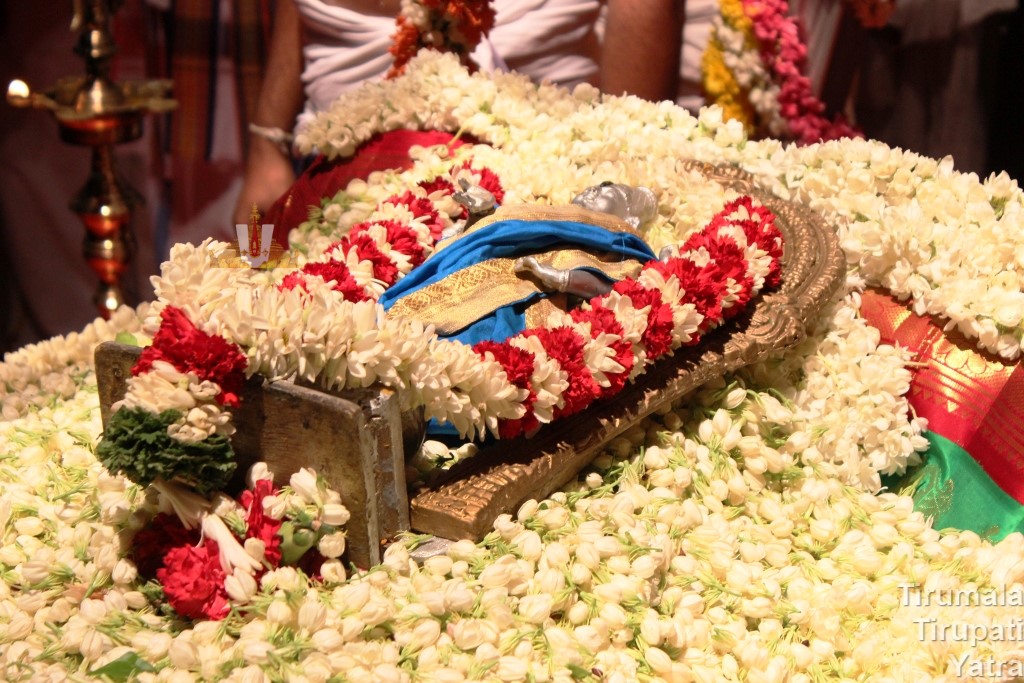
In this seva Bhoga Srinivasa Murthy is placed in the golden swing cot hung in the Shayana Mantapam (Bed Room) by silver chains. One of the descendants of the Tallapaka family will be ready in the Ramulavari path to sing a lullaby for the lord. There will be a camphor plate (haarathi) sent on behalf of Tarigonda Vengamamba.
As the paid devotees sit and watch in rows, Annamayya descendants sing the lullaby, “Jo Achyuthananda Jo Jo Mukunda…” and the pearl haarathi of Tarigonda Vengamamba is offered to the Lord. Lukewarm milk and the panchamritha prasadam prepared with several fruits called “Meva” are distributed to paid visitors.
At the end of this, the doors of the Golden Entrance are closed.
